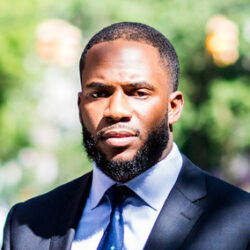Update: Applications for the 2018 Bridge Fellowship are open now through September 2nd.
Marvin Pierre is one of TNTP’s inaugural Bridge Fellows. A former school administrator, Marvin is spending his fellowship year building an alternative education and workforce development program for formerly incarcerated young men. In January, that program, known as Eight Million Stories, officially launched in Houston.
Andre Carol (name changed) was 14 years old when he first entered the juvenile justice system. He’s currently 18 years old, is working on earning his GED, and is interested in pursuing a career as a psychotherapist. He’s been with Eight Million Stories since January 2017.
Click to hear Andre tell his story.
Marvin: You’ve been involved with Eight Million Stories for a couple of months now, and I’m interested in how it’s been for you so far. What's changed about you since you've been in our program?
Andre: At first, I didn’t really like to do the “school thing,” but Eight Million Stories pushed me. It taught me things like balance and work ethic, stuff like that. I think it’s an excellent program for juveniles getting out of jail—instead of just sending us back into the streets and back to jail, we get to learn.
Marvin: What are some of the things you’ve learned?
Andre: That I don’t need run with the crowd; I don't need to fit in. There are other ways to get ahead. I don’t hang around my old crowd anymore. I don’t need them.
Marvin: So, when you were younger, people around you influenced your behavior?
Andre: Yeah. It seemed like half the people in the neighborhood were yelling in my ear, “Come on, let's do this, this, and this.” You feel me? And I just followed. And then, one day, I was at the wrong place at the wrong time and got locked up. That day I got locked up, it messed up my life—I went to jail twice, and gave up half my teenage years.
Marvin: After you went to jail the first time, did things change, or did you go right back to the same things?
Andre: No, things changed. To be honest, jail messed up my head. I was never a thief. I was never hot-headed. I was always quiet and kept to myself. But jail forced me to become hot-headed; I had to change who I was.
I remember, when I was in jail, I’d wake up and think, “I want to come out a different person, a better person, the person I want to be.” But when I got out of jail, that person didn’t come out. I came out like an animal or something—but that animal wasn’t really me.
Marvin: You mean, jail did that?
Andre: Yeah, but I don't want to be like that. I want to go back to being my old self. That's why I like Eight Million Stories. It's teaching me, and it's kind of bringing me back to my old self.
Marvin: Tell me a little more about school. Why didn't you feel like school was the right place for you? And what do you think teachers could do better to help kids like you be successful?
Andre: The school I went to, I mean, it was cool, but I don't like being around a lot of people. I get nervous. And the teachers, instead of just handing us the work and wanting us to sit down, they could talk to us more. I like Eight Million Stories because the teachers sit and teach you individually, and as a class. At Eight Million Stories, we all work together as a team because we're all in the same situation. We're like a bunch of crabs. We all come at it together.
Marvin: You feel like you’ve built a family here?
Andre: Yeah. Everybody up here is like a family. When I first got here, I was hot-headed. I didn't talk to anybody. But I saw how cool everybody was, and my attitude started to get better. It's hard to make me mad now. I owe a lot to y’all. I know if I stay here for a few more months, a new Andre is going to come out—one that everybody likes.
Marvin: So, 10 years from now, where am I going to see Andre?
Andre: Last night I was reading about becoming a therapist, or something like that. I see a bunch of little kids that are way younger than me following in bad people's footsteps, and they think that stuff is cool. That's not cool. That's not the way to go. I want to tell all the young people, “Don't do that.”
Like my little brother, he’s only 11. Some of his friends got in trouble with the law and just because he was there, they wanted to take him to jail. The only reason they didn't was because of how old he was.
Watching him crying through that stuff was hard. That stuff’s not cool.
Marvin: What would you like to see your little brother doing instead?
Andre: I want to see him on track, doing his work and getting A's and B's, because he's smart. He made the honor roll in fifth grade, but sixth grade messed his head up. I just want him to get back on track, and get back to what he was doing in fifth grade, honor roll and doing his homework and stuff. I feel like, if he can do that, he'll be good.
Marvin: What are some of the things you tell him to help him get back on track?
Andre: I tell him, “Everybody that tells you to do something bad, they just want you to do bad things because they’re doing bad things. But there are other ways to live—you can do good. Because if you keep getting in trouble, you’re going to end up like me.” And look at me, I'm 18 in the ninth grade. That's not what's up. That's not where it's at.
Marvin: So, you use your example, both as a positive example of how you can really come up, but also as a story to show him that how it can be tough?
Andre: Yeah. I feel like I'm setting the example for him, showing him how it really is to be on your own. When you're 18, it's hard. I’m not going to lie to you. It's super hard. I try to tell him he's lucky, that he's got it easy. I don't have it easy. I have to do everything on my own. You feel me? I spent half of my teenage years in jail. That's not what's up. Jail's going to change you. It's going to make you worse. It's not going to scare you into getting better. It's going to make you a worse person than you really are.
Marvin: Has Eight Million Stories helped you be who you really are?
Andre: Yea. Like, when I get ready to spazz out, when I get ready to get mad and stuff, I got people that actually care about me. And every time, they really encourage me to go forward, instead of backward like the people in the streets do. The people in the streets always have you going backward. Here, everyone is teaching me to go forward.
I feel like with Eight Million Stories, we’re all after one goal: getting our GED. And I feel like what someone else doesn’t know, I probably know. So, I can help him out. Everybody in there wants to learn. We can help each other learn. I feel like my classmates and my teachers are wonderful. They help me understand everything way better.
Marvin: In the end, what made you want to get your GED? What made that seem more valuable than being out in the streets?
Andre: I really want my GED because I feel like I haven't accomplished anything. And I watch people on TV, like politicians and rappers, and I want what they got. I know they worked hard and went to school to get what they got—I want that, too.
My daddy said before he died, he was like, “Get your education.” And I let him down the first time on the high school diploma. So, now I want to get my GED and prove to him that I can get my education. I'm not going to let him down this time.
Read more about students' experiences in school in The Opportunity Myth—then take the first step by requesting your own free action guide featuring tools and advice to help more students in your community have worthwhile experiences in school.





